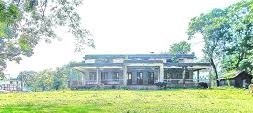
Chapter 1
This is a unique crime story from the Indian state of Assam. The reason for its uniqueness is because in the judicial history of India or anywhere in the world, a judge has been given a death sentence due to the crime committed by him.
Upendra Nath Rajkhowa, as a child was good in studies and studied law. After practising law for many years he was appointed as a judge. He was posted at different places in Assam as judge and during the last phase of his tenure, he was posted as district and session judge in a place named Dhubri, in Assam in the year 1969. He stayed at the circuit house for a few days in Dhubri as the accommodation allocated for the judge was not yet available.
He was married for more than 30 years. He already had a residence in Guwahati and his wife along with his three daughters used to stay. Elder daughter had already completed her education while the other two daughters were still in college. He was allocated the official bungalow in a posh area of the city.
His family used to visit him occasionally. He was about to retire from his post on February 1970. That year he called his entire family to spend the holidays with him in Dhubri for celebrating Saraswati Puja together.
Chapter 2
A few days later, he sent two of his younger daughters back to Guwahati for their examinations, his wife and elder daughter continued staying with him.
One day the judge called his servants and told them to cut down the branches of a tree that was just located outside their bungalow’s washroom, as the branches of the tree was covering the washroom window. Servants removed some branches of the tree, later judge requested to cut down the entire tree itself.
Cutting the entire tree from root left a large pit just behind the washroom that was later made deeper at the request of the judge. He told the servants, that he desire to plant a flowering tree there, so that the next judge coming in this bungalow could remember him.
After a few days, his wife orders servants to fill in the pit. That evening seeing the pit covered, the judge gets irritated and asked the servants to remove all the fillings from the pit and leave it open.
There was a tree behind the kitchen of the bungalow, whose branch was getting expanded towards the kitchen. Judge asks his servant to cut down that tree as well that resulted in a large pit behind the kitchen. The judge told his servant that he desires to plant a flowering tree there as well.
So there were two large open pits inside the bungalow.
Chapter 3
Judge sends his servants and caretaker to enjoy Saraswati Puja. He took his family to the market and returned back around 8PM. They lit a bonfire at the bungalow, as February is a cold month. After the Bonfire and dinner, at around 10 PM the servants and caretaker left for their respective quarters that were located within the campus of the bungalow.
Next day servant arrives for daily house activity, but could not find judges wife and elder daughter. On enquiring, the judge said that one of their relatives is sick and they were informed over the phone last night. So his wife and elder daughter left for the relatives place very early in the morning.
They believed and carried out with their household activity. That day they found that the open pit that was dug up behind the washroom was now covered up with mud. They could not find any new tree planted at the site.
About 15 days later, he requests other two daughters in Guwahati to come and join him at Dhubri as was planning a trip to visit Darjeeling for a vacation. The daughters were initially not willing to come as their exam was just a month away, but on insistence from their dad, they agreed to come down to Dhubri for a vacation trip to Darjeeling.
The daughters also enquired about their mother and elder sister, but their father told them that they went to a relatives place to attend to their sick relatives. Both younger daughters arrive at Dhubri from Guwahati by bus.
The Judge went to receive them from the bus stand in his official vehicle and brings them to his bungalow. That day they had their dinner and went to sleep.
Chapter 4
Servants arrive on the next day and were not able to find the two daughters who had just arrived the last day. On enquiring, the judge told them that they also left for relatives place early in the morning to meet their mother and elder sister. He further told them that he too will be visiting the sick relative soon.
Servants observed the large open-pit behind the kitchen was filled with mud and again there was no flower tree was planted there. So there were two large open pits in the bungalow one was filled when the wife and elder daughter left and after about two weeks another large pit was also filled when other two daughters left.
The next complete month judge remained at the same bungalow doing his usual activities and in April 1970, surrenders his official bungalow and leaves Dhubri. In the meantime neighbours and other relatives enquire about his family, he told everyone that his family went to Delhi and that he is planning to settle down in Delhi after his retirement.
Later in June 1970 another district and session judge gets posted at Dhubri and was allocated the same bungalow. So the new judge shifts with his family to this bungalow.
Meanwhile, one of the servants went to his house in Siliguri during vacation. One day he suddenly meets Upendra Rajkhowa. The judge tells him that he is residing at a hotel ‘Sevoy’ in Siliguri and requests servant not to disclose his whereabouts to anyone.
Chapter 5
Brother of Judge’s wife Mr Sharma was a high ranking police officer in Assam. He had not received any information about his sister and three cousins from February. He tried contacting them many times but was not able to communicate. He called judge Rajkhowa, who told him that his entire family has moved to Delhi and that he too will be moving to Delhi in a couple of days.
When all means to contact with his sister failed, Mr Sharma, went to Dhubri. He went to the residence of district and session judge and told the present judge that he is not able to contact his sister. He also gets in touch with servants and told them about his plight.
One of the servants then tells him about the meeting he had with Judge Rajkhowa a few months back in Siliguri and that he told him that he was residing in a hotel in Siliguri. This strikes Mr Sharma, as to why the Judge was in Siliguri when he had told him that he will be going to Delhi.
He immediately leaves for Siliguri and also contacts local police and reaches the hotel ‘Sevoy’, where he finds Upendra Rajkhowa residing at that hotel for the last couple of months.
On asking the Rajkhowa about his family, he first said that they are in Delhi, but was not able to tell them the exact place in Delhi. Then he said that his family was in a relative’s place but again was not able to provide any details about the relative. At this point, the police grew suspicious.
When asked to provide more information, the judge told them that on that day of February his wife went to washroom where she slipped and her head crashed against the wall and she died. On seeing this mishap, her elder daughter was not able to bear this trauma and she took an overdose of sleeping pills killing herself.
Chapter 6
On asking about the other two daughters, the judge told that he was not able to tell his other two daughters about this mishap as they would not be able to sustain the trauma. Later he decided to inform them about this mishap.
In the evening of the day daughters arrived, he took them to a secluded place besides Brahmaputra river. When he told his daughters about the mishap they were not able to bear this trauma and both jumped into the river and committed suicide.
Police told him to record his statement before a magistrate. He agreed but requested them for some time so that he can freshen up. Police waited at the door of his hotel room but Rajkhowa never came out of the washroom.
Police broke open the door of the washroom and found Rajkhowa had stabbed himself with a knife and was severely bleeding. Police immediately took him to the hospital. Rajkhowa has tried to commit suicide.
It took two months for him to recover fully. After recovering from the stabbing wound, police again started their investigation to obtain the truth about his family. After much interrogation Rajkhowa admitted that no mishap happened with the family.
He also admitted that it was he who killed his wife and all the daughters. Everybody was surprised by this statement, How can a Judge who was on the brink of retirement become a criminal and commit such a crime.
Police enquired about the bodies of victims. Rajkhowa narrated that he had buried the bodies of his wife and elder daughter in the large pit behind the washroom and his two daughters were buried in the pit behind the kitchen in the same bungalow.
Chapter 7
Permission was obtained to dig up the pits present in the bungalow of district and session judge. Police recovered two skeletons from the pit behind the washroom and two more skeletons from the pit behind the kitchen. One of the servants who had helped Rajkhowa to fill up the pits was also arrested.
Police prepared charge sheet and a special additional judge was appointed to preside the trial in court. An ex judge was now being prosecuted for a criminal offence. Rajkhowa was in judicial custody and was locked in Dhubri jail. The day before the trial began Rajkhowa again tried to commit suicide but was unsuccessful injuring himself in the process.
This case was based on circumstantial evidence as there was no eye witness, also motive of the crime was not clear. Rajkhowa was not willing to reveal any further details about this.
The Confessional statement of judge along with statement of the servant who had helped him, the recovery of bodies from the designated place as pointed by him were all presented as evidence.
But they were not able to establish any motive behind this crime by a person aged about 60 years and had been married for about 35 years having three grown-up educated daughters. They were also baffled by the fact that why judge Rajkhowa waited until retirement to commit this crime.
Chapter 8
After two years of proceedings, the trial court gave its verdict of the death penalty. Later Rajkhowa appealed in Guwahati High Court. After a year’s trial, the high court also retained his death penalty.
Rajkhowa appealed against the decision in Supreme Court, but after 10 months of trial Supreme Court also retained his death penalty considering the case itself as rarest of the rare case. The main point highlighted in each judgment was ‘how can a judge commit such a crime’.
Judge Rajkhowa, also filed mercy petition with President of India. Looking at the judgment of all the court’s President of India also retained the judgment of death penalty.
On 14 Feb 1976 in the jail of Jorhat, ex Judge Mr Upendra Nath Rajkhowa was hanged.
It needs to be highlighted that during the entire judicial process Rajkhowa never disclosed the motive behind this gruesome act. An unofficial version is that; judge Rajkhowa’s wife was having an affair with their driver and that the driver was the father of all his daughters.




 (11 votes, average: 4.82 out of 5)
(11 votes, average: 4.82 out of 5)


